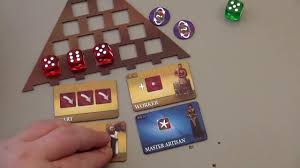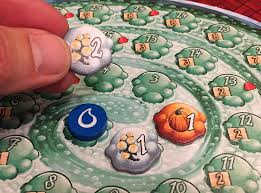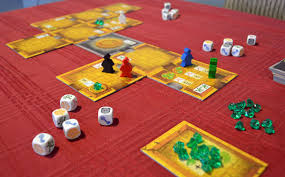Game Mechanics: Mitigating Luck
In the last article, we talked about how to create a great push your luck experience from examples of many games using dice, cards, and bag-building. This week, we’ll look at some effective game mechanics you can use for mitigating luck in your game.
In the game of Monopoly, you roll two dice, add them together and move that many spaces. Whatever you land on has some consequence, such as paying a fine or rent to another player, drawing a card, or allowing you the chance to buy a property.
You have very little control over the outcome. It’s all up to the luck of the dice.
But what if there was some way to mitigate that bad roll that will land you on Boardwalk with someone else’s hotel and bankrupt you?
That’s what we’re going to look at today. Well, not Monopoly per se, but rather how other games have successfully implemented strategies for mitigating luck and how you can use these concepts in your own designs.
Doing Everything for Mitigating Luck
I was introduced to the game Favor of the Pharaoh several years ago by my friend Matt. My wife and I enjoyed the game so much, we bought ourselves a copy shortly after this.
It’s a lesser-known game, but it is an excellent example of how to implement many ways of mitigating luck all in the same game.

Favor of the Pharaoh is a game that is essentially an engine-builder using dice. You roll your dice and collect a tile of your choice based on your roll.
However, it does a number of interesting things to mitigate the luck of a bad roll:
- You “lock” one or more of your dice on every roll and are allowed to re-roll all your other dice.
- Low rolls are not necessarily bad. In many games, rolling 1’s over and over will lead you to defeat and frustration, but in Favor of the Pharaoh, you are collecting sets, runs, and different combinations. A roll of three 1’s is actually quite good!
- You collect tiles throughout the game that give you powers, along with scarabs (that allow you to re-roll dice or add pips to your roll) and more dice.
- If you roll poorly, there is one tile you can always get for free, the Farmer, which will help you build up your dice pool and improve your odds.
As you can see, Favor of the Pharaoh implements several ways for mitigating luck. Very few turns in a game result in no progress or a wasted turn if any. There’s almost always something you can do. It’s like the designer thought of everything!
So, if your game involves dice, take note: Including ways to re-roll, change pips, improve your odds, and score at least something most turns using any dice (including low rolls and random combinations) can really help players develop different strategies and make interesting decisions rather than be completely at the mercy of a bad roll.
Other Good Examples of Mitigating Luck
I mentioned the Quacks of Quedlinburg in my last article about push your luck games. This game includes a mechanic that allows you to put a chip back in the bag, but there is a cost to refresh this item. This can help you when you have a bad draw or push your luck a bit too far.

Escape: Curse of the Temple, which I mentioned in my recent article about creating tension, allows your teammates to help you out of a tough spot, as well as to spend a gem to “unlock” your black skull dice.

There are a ton of examples from other games, from Ticket to Ride, to Friday, to Unbroken, that give players a choice when they draw cards.
Giving a player two cards to choose from, even if neither of these choices is optimal, allows players to make a decision. Rather than a fateful draw from the deck, it is up to the player to decide what course of action is best. If they choose wrong, it wasn’t simply bad luck, and if they choose wisely and their strategy pays off, they can feel good about themselves and the action they took.
Either way, it is better to give a player some choice (just keep it within reason) than to put their fate at the mercy of one bad card or roll at the wrong time.
It really comes down to this: Choice.
It doesn’t matter if your game utilizes dice, cards, or any other component, there are plenty of ways for mitigating luck and allowing players to have more say in their outcome.
What other games have you played that implement some interesting strategies for mitigating luck? How did they accomplish this?
Please leave a comment and share your thoughts.
Next week we’ll be looking at how to make a compelling co-op game.

5 comments
Game Mechanics: How to Make a Compelling Co-op Game – The Board Game Design Course
[…] all players to discard their lowest card simultaneously without penalty. This is a good risk and luck mitigation […]
Nick Gauthier
In Near and Far: Amber Mines, you can spend a food to reroll a 2 on the die.
Joe Slack
Thanks, Nick! That’s another good example.
Sharon Alston
Looks like fun thanks for the tip . I’ve got an idea already. Thanks and Happy New Year!!
Joe Slack
That’s great to hear, Sharon! Happy New Year!